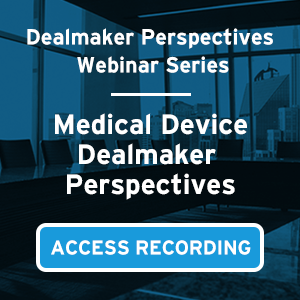 Bass, Berry & Sims recently presented the latest in its Dealmaker Perspectives series on the medical device industry. Ryan Thomas, Member of Bass, Berry & Sims and Co-Chair, Healthcare Private Equity Team, and Frank Pellegrino, Member of both the firm and the Healthcare Private Equity Team, were joined by three leaders in the medical device sector who discussed their perspectives from the vantage points of investment banking, venture capital and company leadership.
Bass, Berry & Sims recently presented the latest in its Dealmaker Perspectives series on the medical device industry. Ryan Thomas, Member of Bass, Berry & Sims and Co-Chair, Healthcare Private Equity Team, and Frank Pellegrino, Member of both the firm and the Healthcare Private Equity Team, were joined by three leaders in the medical device sector who discussed their perspectives from the vantage points of investment banking, venture capital and company leadership.
Here are the important takeaways from the three presenters.
Investment Banking: J.P. Peltier
J.P. Peltier is the Global Head of Healthcare Investment Banking for Piper Sandler Cos. and offered the perspective of an investment banker in the medical device/technology sector.
- Valuations for medical device makers are at their highest-ever level, with enterprise values reaching 14.5 times future 12 months’ revenue.
- Two factors explain the valuations: The $3 trillion the U.S. government injected into the economy in the early days of the pandemic increased the amount available for investment. With bond yields at historic lows and other sectors temporarily crushed by stay-at-home orders, investment flowed to equities in two sectors: 1) technology that allowed people to move from in-person to virtual settings for everything and 2) healthcare, with its leading role in fighting the pandemic.
- These historic valuations are driving the hottest market for initial public offerings (IPOs) in med tech since 1995. Piper Sandler is advising eight med tech companies that have confidentially filed for IPOs.
- Mergers and acquisitions slowed a bit in 2020 because activity was halted by stay-at-home orders, but it has roared back so far in 2021, with 27 material deals announced already, compared with an average of about 50 deals per year in the period 2010-20.
- Special purpose acquisition companies (SPACs) have been active in healthcare generally and med tech specifically. Out of 435 active SPACs, 58 are devoted to healthcare. SPACs offer company founders and early investors a mix of the benefits of IPOs—where valuations are highest—and strategic acquisitions—which offer a liquidity event.
Venture Capital: David Adair
David Adair, MD, MBA, is the Co-Founder & Managing Director of Solas BioVentures, an early-stage investor in biopharmaceuticals, medical devices, diagnostics, digital health technologies and related opportunities in medicine.
- The medical Internet of Things is a big driver for medical devices that can interact with enterprise health information systems.
- Telemedicine and other digital health services were big winners from the COVID-19 pandemic: Necessity drove patients to try these platforms, driving new adoption; insurers, with no choice but to go along, saw many cases where telemedicine could deliver quality care.
- The pandemic also amplified the success of high-quality, high-potential companies built on a strong clinical foundation, such as makers of messenger RNA (mRNA) therapeutics.
- The strongest device sectors continue to be the traditional big three: cancer, cardiac and central nervous system. Three areas that are hot right now are gastrointestinal, pulmonary and women’s health.
- Solas looks for companies that have identified monumental, rather than incremental, changes to fill a clear clinical need.
- The firm looks for management teams driven by a purpose, because those founders will have the passion to persevere through the ups and downs of an early-stage device company.
- Solas often is the sole investor at the “pioneer” stage of a company, with investments in the $250,000 to $1 million range, and then usually partners with another investor for any subsequent funding rounds.
Device Company Leader: Michael Kujak
Michael Kujak is President and CEO of Francis Medical, a company that was spun out of NxThera before it was acquired by Boston Scientific Corp. in May 2018.
- Francis Medical is developing what Kujak described as “game-changing technology” that allows physicians to ablate cancerous prostate tissue with water vapor, thereby avoiding many of the side effects associated with surgery and radiation.
- Francis Medical has a large market opportunity—about 1.4 million men globally are diagnosed with prostate cancer each year—and its technology solves a clear unmet clinical need.
- Many physicians recommend monitoring low disease cancer instead of immediately removing it because of the impact on quality of life from surgery, such as increased urinary incontinence and erectile dysfunction.
- Echoing Adair’s comments on the importance of the leadership team, Kujak said he seeks high-energy, experienced subject matter experts whose skills and experience are both additive and complementary.
- In fundraising, he counsels to start with the end in mind in terms of both the amount of capital you want to raise and the timing of the exit.
- His approach is to be an open book and allow investors to understand the business, the technology and his leadership team.
- The current investors in Francis Medical include both venture firms and strategic investors: While they sometimes have different objectives, the company benefits from their diverse perspectives.
To listen to the Medical Device Dealmaker Perspectives webinar, click here. More programs in the Dealmaker Perspectives webinar series will be announced soon—sign up here to be notified.
To access the recording and key takeaways from other webinars in the series, click the links below:


